Environment
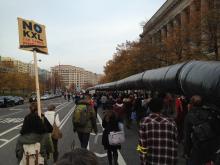
Midway through his nationwide, one-month Do The Math tour, Bill McKibben — author, environmental activist, and founder of 350.org — attracted a crowd that packed the Warner Theater in downtown Washington, D.C., on Sunday.
Joined both onstage and by video by a diverse group of speakers, including Rev. Lennox Yearwood of the Hip Hop Caucus, author Naomi Klein, and Archbishop Desmund Tutu, McKibben’s Do The Math tour brings to light the stark numbers of our current climate reality, first brought to the public’s attention in his viral article in Rolling Stone this past summer.
The three main numbers are as follows: 2 degrees Celsius is the maximum level of warming our planet can endure before real catastrophe occurs. To stay below 2 degrees C, we cannot burn more than 565 gigatons of carbon dioxide. But the problem is that the fossil fuel industry has 2,795 gigatons in their reserves — five times the safe amount to burn. As is their business plan, to reap the profit from these reserves, the fossil fuel companies plan on burning all of it, “unless we rise up to stop them” states the 350.org website.
On Saturday, Sojourners sent a group of staff members sailing down the Anacostia River.
But this was no pleasure trip.
Dottie Yunger, from the Anacostia Watershed Society, teamed up with Sojourners’ Creation Care campaign to teach some of our staff and a few other members of the local community about the state of the Anacostia river, how we as people of faith can be better stewards of our God-given resources, and how we can help create a healthier system where all creatures (both human and non-human) can survive and flourish.
Here are a few reflections from the trip.

Photographer James Balog has a story for you, and it might be one you haven’t heard before. Starting in 2005, he and a team of adventurous photographers set out to provide visual, undeniable evidence for climate change. What they found he described as “decrepit old men falling into the earth and dying:” glaciers worldwide disappearing at record rates.
The film Chasing Ice is the story of their Extreme Ice Survey as they place time-lapse cameras on glaciers in Greenland, Iceland, Montana, and Alaska, and watch as they disappear. The public does not want statistics, they say. The public is being misled to believe that scientists do not agree on climate change. The public is losing interest but needs to pay attention.
As Balog and his team will tell you, the memory cards in their cameras contain the memories of the landscape, a “limitless universe of forms,” that will never be seen again. Man-made climate change (as documented by ice cores from the very glaciers that may not exist in a few years) is fundamentally altering our geology.

It is not surprising that our purely secular “environmental” movements have played out their ability to change society. For the changes we need to undertake are not only technological and political, but deeper and more difficult. They call on us to shape new institutions and new values.
When God’s Wind shattered Pharaoh’s power at the Red Sea, it was only the beginning of the creation of a new society. It took 40 years of struggle, of transformation and mistake, backsliding and grumbling, to ready a people that could live in a sacred relationship with each other, with the Earth, and with the Breath of Life.
So even if we were to shatter the gross and domineering political and economic power of our modern pharaohs, the giant corporations of Big Oil, Big Coal, Big Unnatural Gas that will not relent from over-burning and overpowering us, we would still need to be growing what religions claim to offer: a new vision of our lives.
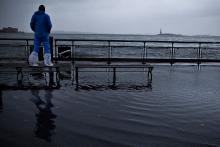
Editor's Note: Sojourners offices, which are based in Washington, D.C., will be closed due to the weather. We pray for the safety of our staff, neighbors, and all those affected by this storm.
God, we pray for all those along the East Coast in the path of Hurricane Sandy. Grant safety to all, including the first responders. We pray for all those who will lose electricity and whose homes may be been damaged. But we pray especially for those who have no homes and no shelters in times such as these. We ask that your hand would protect them and keep them safe. May our paths cross with theirs so that we might have an opportunity to love and serve them. Amen.
"O Lord of LIght" by the Innocence Mission

It was game time. The Saturday night crowd on the Vermont campus was festive, boisterous, pumped. People cheered and whooped when told that one of their heroes, climate activist Tim DeChristopher — serving a two-year federal sentence for his civil disobedience opposing new oil and gas drilling in Utah — would soon be back on the field.
When the man on the stage, 350.org’s Bill McKibben, said it was time to march not just on Washington but on the headquarters of fossil fuel companies — “it’s time to march on Dallas” — and asked those to stand who’d be willing to join in the fight, seemingly every person filling the University of Vermont’s cavernous Ira Allen Chapel, some 800 souls, rose to their feet.
McKibben and 350, the folks who brought us the Keystone XL pipeline protests, are now calling for a nationwide divestment campaign aimed at fossil fuel companies’ bottom line. Beginning with student-led campaigns on college campuses, modeled on the anti-apartheid campaigns of the 1980s, they’ll pressure institutions to withdraw all investments from big oil and coal and gas. Their larger goal is to ignite a morally charged movement to strip the industry of its legitimacy.
“The fossil fuel industry has behaved so recklessly that they should lose their social license — their veneer of respectability,” McKibben tells his audience. “You want to take away our planet and our future? We’re going to take away your money and your good name.”

Last Friday I found out I would be traveling to New York for a Climate Action Prayer Rally at the second presidential debate. I barely slept all weekend, I was so excited. I’ve never been north of Washington, D.C., before, never seen cities like Philadelphia, Baltimore, or New York. But I wasn’t just excited to see these cities, I was excited because of the reason I was going to see these cities.
I accompanied our Creation Care Campaign Director, Alycia Ashburn, and our friends from Young Evangelicals for Climate Action (YECA) to Long Island, where we would make our presence known at the debate.
Creation care is something I feel very passionately about. As a person of faith I think it is my responsibility to protect this beautiful planet that God has given us. To advocate for creation care at such an important venue is truly an honor and privilege; as I joined my brothers and sisters in sending forth a ripple of hope in the water and offering a witness that is faithful and just.

God created the earth to produce every thing Adam and then Eve — and then their issue, and then all of us — would need. In the beginning, the garden needed little tending, but — due to a rather fortunate fall — eventually Adam and Eve, as his helpmate, and their children and the issue of generations had to toil the earth to pull from the garden those things God intended to meet their needs.
Along the way, progress was made in the form of extensions of the garden bounds, the distribution of water and other nutrients, applications of healthful foods and herbs, techniques for every aspect of garden production. A community grew from a couple who worked hard as stewards, first out of penance and then, I think, out of love for the land provided to sustain them and for each other as they worked together. This is the story of how sustainability came to be.
To simplify: God created the Heavens and Earth. He designed a glorious garden and put in it everything needed to make that garden productive: plants, water, clean air, soil, enrichers (bugs, worms, life, decay), animals, and the Sun, the first and last fuel. And, finally, He made man and woman.
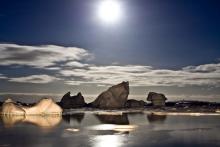
I’ll be traveling to New York tomorrow with a number of Christian colleagues. We’re having a rally — a Climate Action Prayer Rally! And you can join us!
I’m not sure about you, but I’m incredibly disappointed that our nation’s leaders – from all sectors, all parties, and all levels – continually neglect to take leadership on our climate and energy crisis.
There are many reasons that climate change should be a top election issue, but here are just a handful of the most important ones.
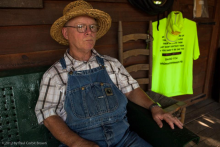
Larry Gibson, “Keeper of the Mountains,” died Sunday, Sept. 9 at his home on Kayford Mountain, W.V. He was 66. His wife and three adult children survive. Gibson had a fifth grade education, a career as a custodian at an Ohio automobile factory, and retired to the obscure and abandoned place of his birth. Gibson stood 5’2”.
“God chose the weak things of the world to shame the strong” (1 Corinthians 1:27b). From the halls of the nation’s most prestigious universities, through innumerable rallies, protests, and arrests, to the many hundreds of tours he hosted on Kayford, Gibson spoke truth to power with uncompromising integrity, unflagging determination, and heroic courage.
Larry Gibson returned to West Virginia in the 1990s, and to his shock, learned that a new method of coal extraction was literally blasting mountains apart to extract coal while shoving the vast remaining rubble into adjacent valleys burying small streams. Ecosystems were being severely, irrevocably degraded. Scarcely anyone knew about mountaintop removal back then, let alone cared.
New tracking software developed by Kevin Gurney, an ecologist at Arizona State University is intended to help cities across the country keep their word on climate. Many mayors have pledged to reduce their carbon footprint, but they have no objective way to measure progress. The software will allow them to identify and target areas of the city that are releasing the most carbon, in order to address the real problem areas.
The idea of a personal carbon footprint is not new, but software that can follow our dirty tailpipes down the street is certainly revolutionary. Could the uncomfortable feeling of being watched be the encouragement city residents need to change their habits?
"Gurney collects piles of information about a city's energy diet — from utilities, transportation departments and air-pollution monitors. When he analyzed Indianapolis, Gurney and colleagues from Purdue University and other institutions could pinpoint emissions down to the level of a building or a street."
It’s been a good week for getting real. After Tuesday’s revelation that the majority of Americans link increased natural disasters with climate change, a new report yesterday indicates that they may be right.
In their newly-published report, reinsurance company Munich Re claimed that global climate change has been driving natural disasters and extreme weather events, and that this trend will increase as the climate continues to change.

In my last column, "Three Numbers that Predict the Future of the Planet", I wrote about the state of the climate crisis and focused on three key data points that reveal a bleak, though not altogether hopeless, reality for us and for the rest of the planet.
As promised, this column is forward-looking and moves from describing the problem to prescribing the solution. To this end, I continue to draw heavily from the wisdom of Bill McKibben, Jim Ball, and other climate prophets who understand the times and are faithfully fighting to get us on the right track.
The way forward is not easy, but it will be good in the long run. Essentially, we need to set and enforce a limit on all remaining global warming pollution on the national and international scale, which will, we hope, keep warming to within 2oC. This will include some sort of pricing mechanism so that polluters have to take responsibility for paying for the costs of their own pollution. The problem is that we have not yet been able to muster the socio-political momentum necessary to reach these binding agreements. Turns out the polluters (largely the fossil fuel industry) don’t want to have to clean up after themselves. They’re also willing to fight with billions of dollars in campaign contributions and lobbying money to keep the status quo.

The climate crisis is getting bad and we may be finally starting to notice. With increasingly crazy weather across America—scorching heat waves, massive fires, destructive derechos, devastating droughts—polls are starting to show a growing awareness of and concern for how our massive amounts of pollution are changing the weather and therefore changing our lives (mostly for the worse).
I know this is starting to sound alarmist and extreme. It should. Because reality is starting to get pretty desperate for those whose lives and livelihoods depend on a relatively stable and predictable climate. At the end of the day, that’s all of us. The first to get hit, however—and they are currently getting hit hard—are those who grow and raise our food (farmers, ranchers, fishermen, etc.), those who are economically and physically vulnerable (the elderly, sickly, homeless, etc.), and those who just happen to be in the wrong place at the wrong time (the victims of these storms and fires). And while we’re starting to feel the impact of climate change in the United States, our global neighbors in regions such as Africa have been the ones bearing the brunt of the suffering.
After decades of scientific studies and expert warnings, climate change is no longer something being debated; it is something being experienced. Let’s just hope we do what’s right to overcome this crisis before it is too late. Because “too late” may be coming a lot sooner than we realize, and “what’s right” may be a lot harder than we want to accept.
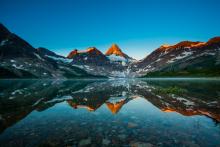
For most of my life, I have been a “Christian with conjunctions.”
So I’m a Christian BUT… I’m not like that street preacher who yells about hell and damnation on the downtown corner.
I’m a Christian BUT I’m different from the televangelist who raises his fist in the air and screams about salvation.
My own priest, the Rev. Thomas Murphy, first described himself as a Christian with conjunctions in a sermon the morning before our Episcopal congregation took to the streets during a festival in downtown Asheville, N.C. Across the street from a karaoke booth, we handed out cold water to festivalgoers and offered a simple ministry with no judgment or obligation.
For most of us, it was the first time we had prayed the Eucharist in public, with our colleagues, students, and neighbors walking past. The white banner above us proclaimed: “God loves you. No exceptions.”
I have realized that the ubiquitous street preacher has something to teach me: there is virtue in being bold about my faith. Through my research on congregations and climate change, this public witness to God’s love has become easier for me as my church life now reflects my deep value of God’s good earth.
The stakes of silence are high. If we don’t speak out and act on our moral mandate to reconcile with creation, we risk destroying God’s very creation.
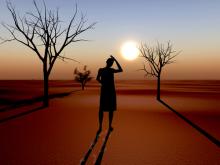
Because the scientific evidence surrounding climate change is clear, and the implications for humankind are many, the response to these global challenges needs to be persistent, organized, and significant. As Jesus calls upon humankind to “love thy neighbor," and as the Old Testament prophets remind us to strive for justice, we recognize that within a deeply connected world “neighbor” implies all that God has created, and injustice anywhere is injustice everywhere.
So an implication of Jesus’ words and actions is to share and receive the Good News not only on Sunday mornings, but through daily acts of long-term advocacy that promotes sustainable livelihoods. With COP18 in Qatar on the horizon, the time has come when humanity can no longer afford to fight over our resources, and the moment is upon us to prod our elected officials toward legally binding legislation that values the gifts of creation that God has entrusted us to manage.

The melting of sea ice during summer in the Arctic is part a natural cycle, but the rate at which the sea ice is currently melting is unprecedented, as illustrated in today’s BBC News.
"Norwegian researchers report that the sea ice is becoming significantly thinner and more vulnerable.
Last month, the annual thaw of the region's floating ice reached the lowest level since satellite monitoring began, more than 30 years ago.
It is thought the scale of the decline may even affect Europe's weather."

COAL, NATURAL gas, petroleum. Thoughtlessly we call these substances “fuels”—fuels to burn for creating pleasant climates inside homes and offices; fuels to power appliances and engines. For years, like nearly everyone, I never thought beyond our mere use of these things. I neglected to consider their role in the Earth’s wider economy.
This all changed when my family moved to a Wisconsin peatland in 1972. Since then, conducting research there with my graduate students has produced four decades of discovery.
For thousands of years, wetland plants and algae in a bay of glacial Lake Waubesa took carbon dioxide from the atmosphere. They transformed it by photosynthesis into the carbon structure of life, eventually adding their remains, page upon page, to the accumulating peat. Eventually, this peat filled the bay for an area more than a mile long, reaching a depth of 95 feet at the present lake edge. When first I walked here, I saw the vibrant surface of plants and wetland creatures; now, in my mind’s eye, I also see the deep-layered remains of creatures below.
Also standing and walking here (much more gracefully than I) are sandhill cranes. These stately creatures, as conservationist Aldo Leopold observed, “stand, as it were, upon the sodden pages of their own history.” Elsewhere, the sodden pages of peat deposits have been cut over the ages to be dried for fuel. The early Romans saw this practiced by conquered peoples of northern and western Europe. Peat was also used as fuel in Ireland, Scotland, and northern Europe after forests were cleared for agriculture. And peat is the precursor of coal, transforming under geologic pressure into brown coal, bitumen, bituminous coal, and anthracite.
“Peace for humanity is not only the absence of war, or the end of violence ... For us Christians, peace is based on a fundamental new relationship between mankind and God. That is why Christ said he brought peace, ‘not as the world gives.’ He brought a different peace.” – Bishop Samuel Ruiz García, known as Don Samuel, a champion of the poor and of the indigenous people in southern Mexico
Eastern Congo is home to some of the world’s most stunning scenery—and some of its most brutal and unimaginable violence. The relationship between these two symbols of the region is a close one.
Part of the call of Christian peacemakers is not only to make peace between people a reality, but also to bring peace between people and the planet. In his work, conservationist Dominique Bikaba recognizes that peace between people and peace with our environment are closely intertwined, and he is seeking to bring about both.
Armed groups are waging war in eastern Congo, taking no heed of the grave impact that the conflict is having on the environment around them. The resources of the region are being exploited, to the detriment of future generations. This disregard for the communities of the region is a modern-day salting of the land. It’s a practice well known to the people of Israel in the Old Testament, in which armies would spread salt on the land of their adversaries so that nothing would grow there (see Judges 9:45).
The conflict in Congo is being waged on local communities—but Dominique is a problem-solver. He is seeking creative ways to conserve these communities while conserving the environment they inhabit, fostering the inherent relationship between the two. He is “bringing the forest to the community.”

An examination of current public debate reveals a divide between the “brown agenda” of economic opportunity and the “green agenda” of environmental sustainability.
On the one hand, a “brown agenda” concerns economic opportunity, or in other words, the alleviation of poverty. In light of ongoing distress surrounding malnutrition, infant mortality, and unemployment, the brown agenda is important, urgent, and worthy of support. On the other hand, a “green agenda” relates to environmental sustainability and care for the Earth. As scientific reports affirm the reality of climate change, and in recognition of decreased access to clean water and biodiversity around the world, the green agenda is also deeply important, urgent, and worthy of support.
With the above thoughts in mind, one recognizes that both brown and green agendas are essential for the promotion of life. However, the proponents of each agenda seem to be at odds with the adherents of the other. For example, far too many with a “brown agenda” believe that the best way to reduce poverty is to reduce environmental controls, and to the contrary, those engaged with the “green agenda” too often place the needs of the Earth before the livelihoods of the poor and marginalized. As a result of this persistent struggle between “brown” and “green," progress on both agendas is limited, and our path toward economic opportunity and environmental sustainability is severely off course.